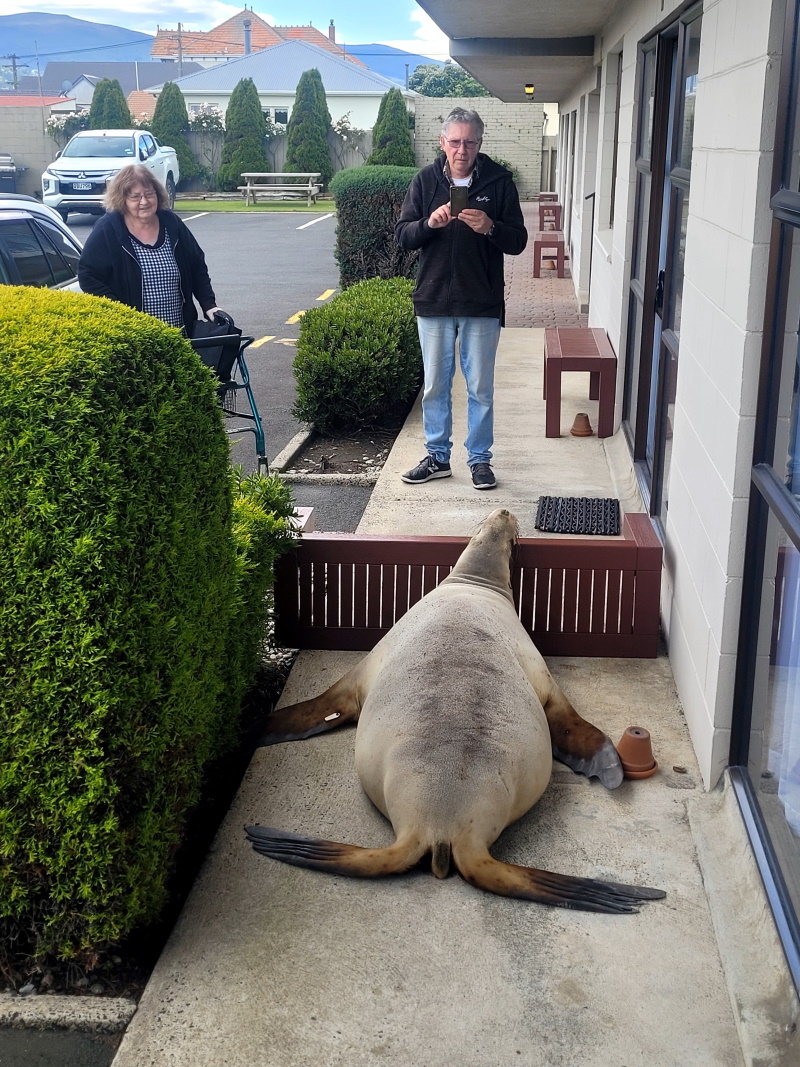
Mothers are working on weaning their pups from last season, many heavily pregnant and due to give birth in the next three weeks.
As they are ready for mating soon after they give birth, the male sea lions are super-interested in finding the females. You will have seen them patrolling the beach.
Maybe a male has checked you out while you are surfing, worked out you were not quite what he was looking for, and then moved on?
Meanwhile, the females are coming inland to hide from the sleuthing powers of the males searching for them along the coast.
Each year, the females seem to be coming further inland, and earlier than the year before.

Hiriwa, a fourth-generation descendant of Mum, will be turning 14 this season.
She has already had 10 pups, which means she has not missed a season since turning 4 years old.
Five of those pups were female, and four of those are already breeding.
She is a great grandmother — the first seventh-generation Dunedin pup was born to her line at Smaills last year.

This year, Hiriwa has been really pushing inland boundaries.
In late November, she was up against the road in Westwood.
Then she tried to check in to the Adrian Motel, joining a number of other pregnant females who have been hiding around Marlow Park.
She also spent a week or two checking out back-yard habitat in Ocean View.
All the while, Dunedin City Council (DCC) roading have been helpfully responding to provide necessary signage to slow traffic on roads that pose a real risk to these females, who are merely seeking a quiet place where the males will not discover and harass them.
Those of you who have provided space for these sea lions to sleep in your back yard, or navigated around them at the park, will have noticed how much they are just wanting to rest.
After a day or two, female sea lions will find their way back to the sea for food, then back for more rest, perhaps to the same place if she thinks it is secure. Or she may choose another location if she wants to keep the boys guessing.
This is the preseason hustle. The places chosen for hiding away are not where the females plan to give birth to their next pup.

It took me two seasons to work out how she was getting there.
I love the way Dunedin public are embracing sea lions.
A big shout out to the DCC and its roading contractors for their ongoing efforts to make our coastal roads safer for sea lions and other road users.
DCC will also be keeping John Wilson Ocean Dr closed to traffic from December 23.
I would also like to acknowledge Beachlands Speedway for agreeing to postpone fireworks, planned for last weekend, in recognition of the disturbance this would pose for female pakake hiding in the dunes.
Keep an eye on DCC’s social media pages and website for any further road and beach restrictions.
All the best for Christmas and the new year!
Keeping sea lions safe
Knowing sea lion pups are increasingly part of the Dunedin summer beach scene, what do we need to think about?
■Please give them space and let them get on with their own thing.
Admire them from a distance, and get out of their way if they are coming through your picnic site.
■Check beaches before letting dogs off leads. Ask locals if there are sea lions about that you may need to be aware of. Be ready to take control of your dog if a sea lion turns up — it is a requirement to have your dog on a lead if you are within 20m of protected wildlife.
■If you see a sea lion at risk of being hit on the road, or find a sea lion pup in your back yard or a public place where you think it might be at risk, call Doc through the 0800362468 (DOCHOT) number.
Dunedin is unique in the country in facing the issue of threatened marine mammal breeding in suburbia. On the phone, get through to a real person, then tell them you need to be put through to the Dunedin duty officer to discuss a sea lion issue.
■You may also see the summer rangers out and about. These rangers are checking coastal sites and amenities and can pass information back to both Doc and DCC to help address emerging issues.
DCC have animal control officers on duty and roading contractors who respond to provide road signage in emergency situations. You can contact them through their 24-hour (03)477-4000 number.
- Jim Fyfe














